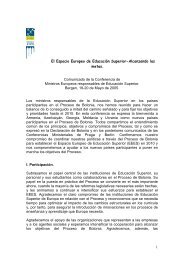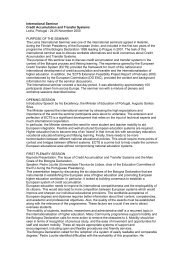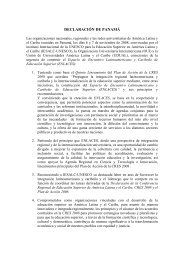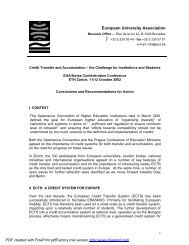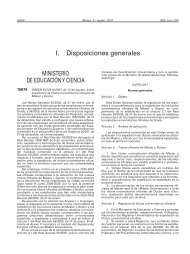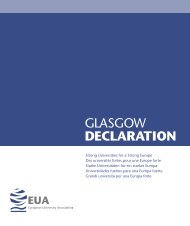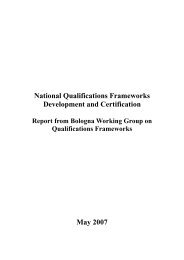New Zealand and the Bologna Process
New Zealand and the Bologna Process
New Zealand and the Bologna Process
Create successful ePaper yourself
Turn your PDF publications into a flip-book with our unique Google optimized e-Paper software.
10T 2Table TWO<strong>Bologna</strong>’s Degree OutcomesOutcomesFirst CycleQualifications that signify completion of <strong>the</strong> first cycle are awarded tostudents who:• have demonstrated knowledge <strong>and</strong> underst<strong>and</strong>ing in a field of study thatbuilds upon <strong>the</strong>ir general secondary education, <strong>and</strong> is typically at a levelthat, whilst supported by advanced textbooks, includes some aspects thatwill be informed by knowledge of <strong>the</strong> forefront of <strong>the</strong>ir field of study;• can apply <strong>the</strong>ir knowledge <strong>and</strong> underst<strong>and</strong>ing in a manner that indicates aprofessional approach to <strong>the</strong>ir work or vocation, <strong>and</strong> have competencestypically demonstrated through devising <strong>and</strong> sustaining arguments <strong>and</strong>solving problems within <strong>the</strong>ir field of study;• have <strong>the</strong> ability to ga<strong>the</strong>r <strong>and</strong> interpret relevant data (usually within <strong>the</strong>irfield of study) to inform judgments that include reflection on relevant social,scientific or ethical issues;• can communicate information, ideas, problems <strong>and</strong> solutions to bothspecialist <strong>and</strong> non-specialist audiences;• have developed those learning skills that are necessary for <strong>the</strong>m tocontinue to undertake fur<strong>the</strong>r study with a high degree of autonomy.Second CycleQualifications that signify completion of <strong>the</strong> second cycle are awarded tostudents who:• have demonstrated knowledge <strong>and</strong> underst<strong>and</strong>ing that is founded upon<strong>and</strong> extends <strong>and</strong>/or enhances that typically associated with <strong>the</strong> first cycle,<strong>and</strong> that provides a basis or opportunity for originality in developing <strong>and</strong>/orapplying ideas, often within a research context;• can apply <strong>the</strong>ir knowledge <strong>and</strong> underst<strong>and</strong>ing, <strong>and</strong> problem solving abilitiesin new or unfamiliar environments within broader (or multidisciplinary)contexts related to <strong>the</strong>ir field of study;• have <strong>the</strong> ability to integrate knowledge <strong>and</strong> h<strong>and</strong>le complexity, <strong>and</strong>formulate judgments with incomplete or limited information, but thatinclude reflecting on social <strong>and</strong> ethical responsibilities linked to <strong>the</strong>application of <strong>the</strong>ir knowledge <strong>and</strong> judgments;• can communicate <strong>the</strong>ir conclusions, <strong>and</strong> <strong>the</strong> knowledge <strong>and</strong> rationaleunderpinning <strong>the</strong>se, to specialist <strong>and</strong> nonspecialist audiences clearly <strong>and</strong>unambiguously;• have <strong>the</strong> learning skills to allow <strong>the</strong>m to continue to study in a manner thatmay be largely self-directed or autonomous.Third CycleQualifications that signify completion of <strong>the</strong> third cycle are awarded tostudents who:• have demonstrated a systematic underst<strong>and</strong>ing of a field of study <strong>and</strong>mastery of <strong>the</strong> skills <strong>and</strong> methods of research associated with that field;• have demonstrated <strong>the</strong> ability to conceive, design, implement <strong>and</strong> adapt asubstantial process of research with scholarly integrity;• have made a contribution through original research that extends <strong>the</strong> frontierof knowledge by developing a substantial body of work, some of whichmerits national or international refereed publication;• can communicate with <strong>the</strong>ir peers, <strong>the</strong> larger scholarly community <strong>and</strong> withsociety in general about <strong>the</strong>ir areas of expertise;• can be expected to be able to promote, within academic <strong>and</strong> professionalcontexts, technological, social or cultural advancement in a knowledgebased society.ECTS CreditsTypically include 180- 240ECTS credits120 ECTS credits, with aminimum of 60 credits at <strong>the</strong> levelof <strong>the</strong> 2nd cycleNot specified




